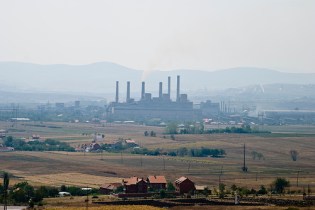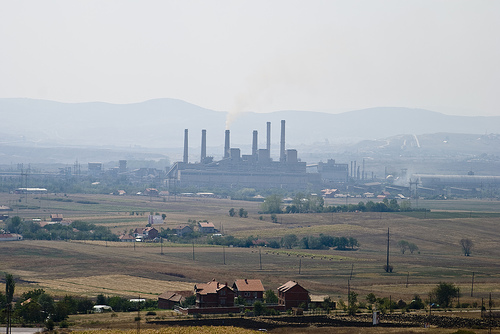
An existing coal plant in Kadikej, Kosovo. (Photo by Andreas Welch.)
The U.S. State Department is one of those places where, for better or for worse, a long-term outlook has prevailed in the past. Faced with the overwhelming problem of totalitarianism, secretaries of state developed policies of containment and Cold War that dominated the planet’s public life for decades; historians debate their soundness still, but there was an unbroken resolve behind them that lasted across generations.
That’s why it’s odd to see State so feeble in coming to grips with by far the biggest international problem we face at the moment: the spectre of climate change that now haunts an entire planet. Clearly it puts at risk security, cooperation, development: everything State is charged with monitoring and protecting.
But when it came time to judge the proposed Keystone pipeline, the State Department pronounced itself uninterested in the climate impacts of helping open up Canada’s tar sands, the second-biggest pool of carbon on earth. And now, apparently, the department is leaning on the World Bank to approve the necessary loans for a giant coal-fired power plant in Kosovo despite a barrage of studies showing that the plant will hemorrhage money and carbon.
In the case of Keystone, the State Department was responding to pressure from Canada, and also, as Freedom of Information Act inquiries made clear, to lobbying from politically connected companies like TransCanada. In Kosovo it’s harder to figure out State’s motives — but it’s probably at least in part a desire for a short-term fix to local energy challenges by exploiting the locally available lignite coal (the dirtiest kind). Kosovo sits on the fifth largest deposit of lignite coal in the world.
But many Kosovans have risen up against the proposed project — and many people in other parts of the world too (here’s how to join them). Because global warming, if it means anything, means that we can’t keep making short-term fixes that contribute to long-term problems. We need to stop burning coal, and we need to make the investments to allow emerging countries to leapfrog into an efficient, renewable-energy future.
One never knows where the front lines of the climate battle will be next: a Canadian pipeline, a Kosovan coal plant. But in a world with one superpower, it’s a good bet the U.S. State Department will be involved, and it’s time for it to start acting as if its decisions matter for centuries to come. Because they do.



